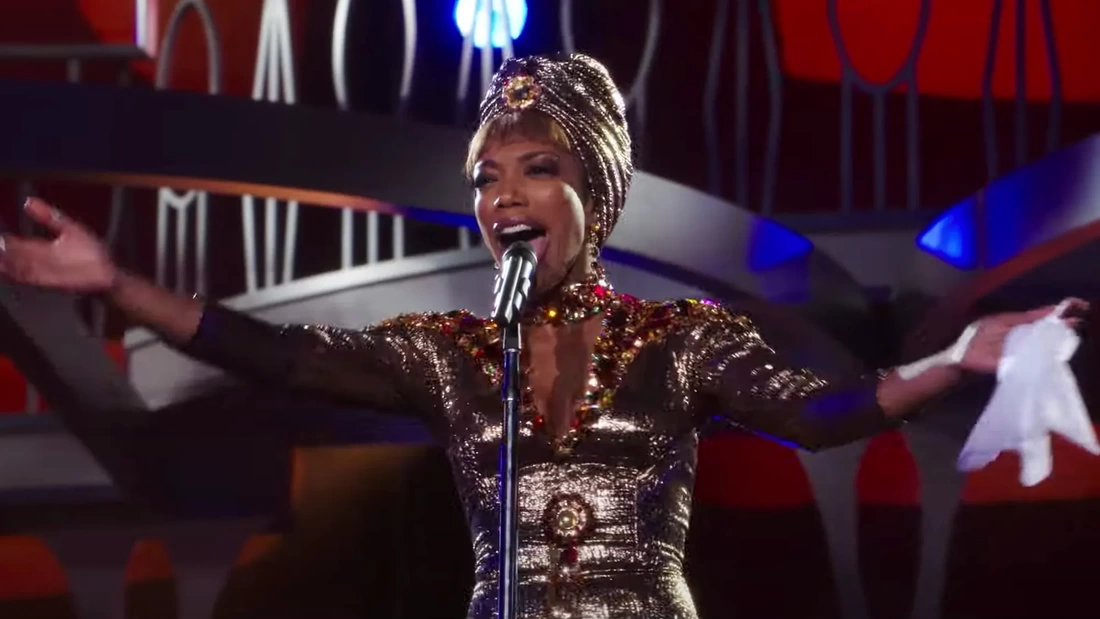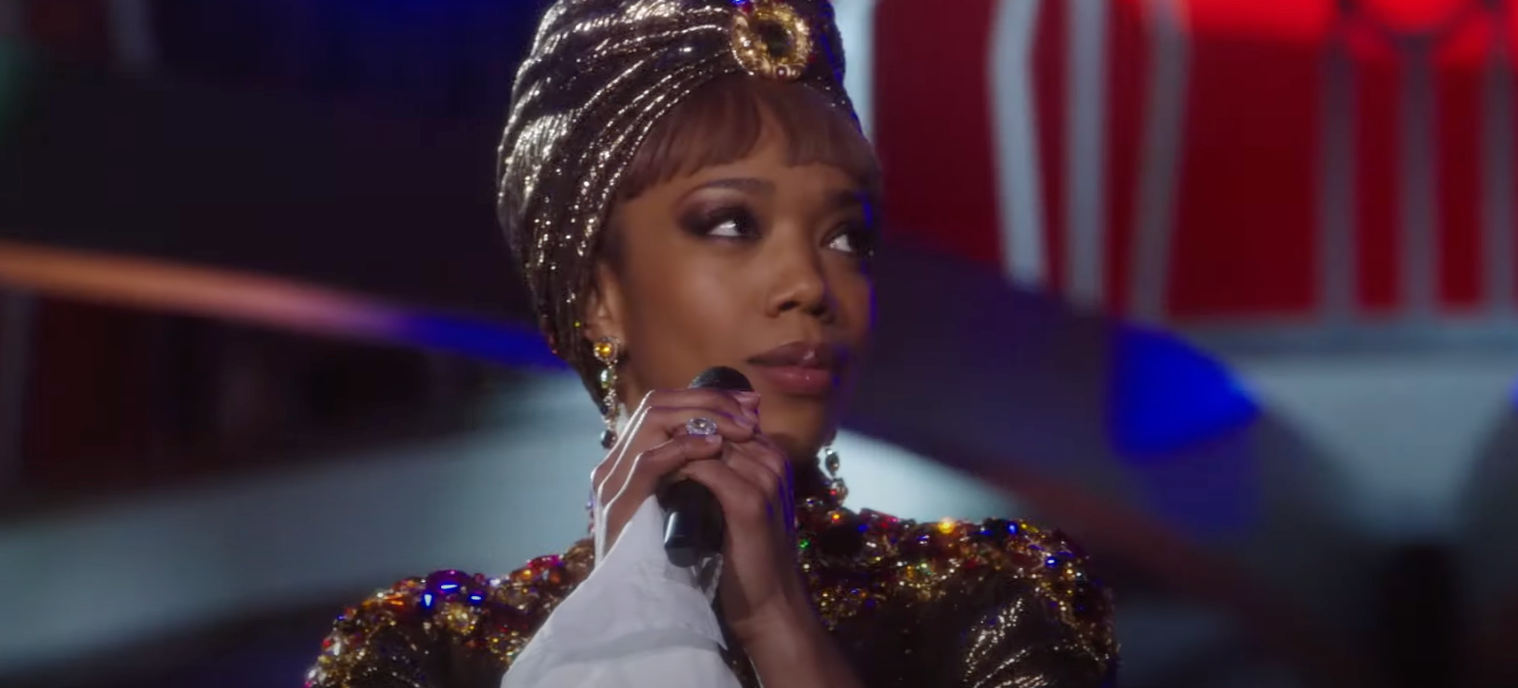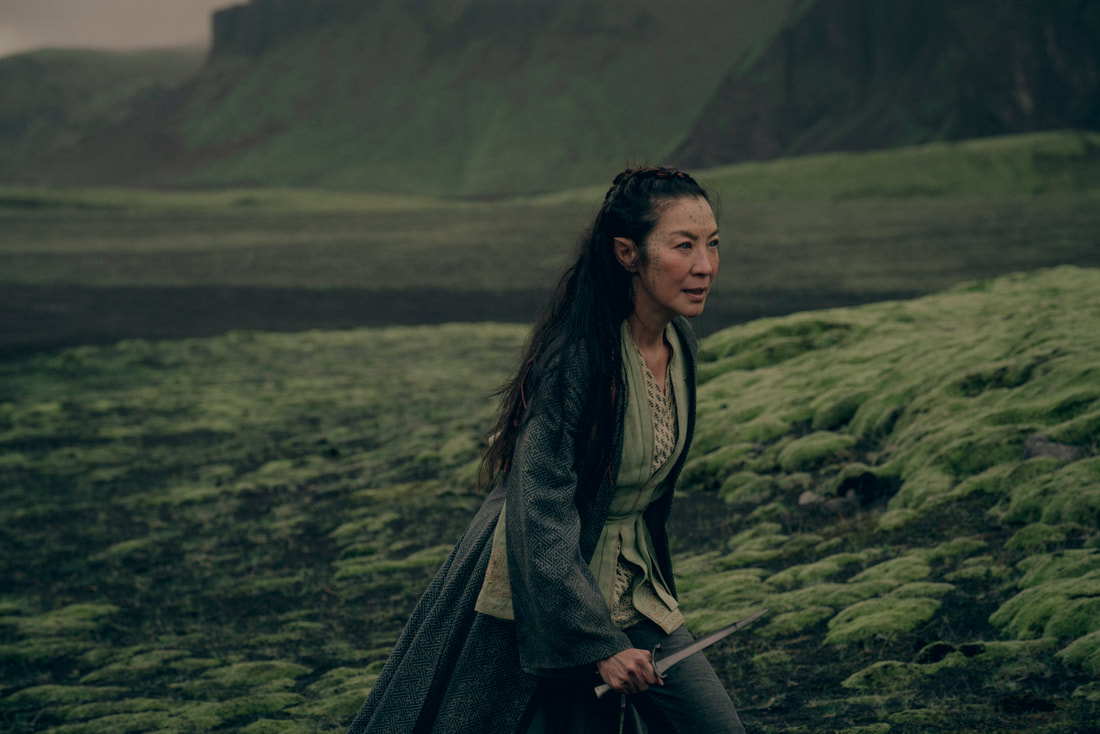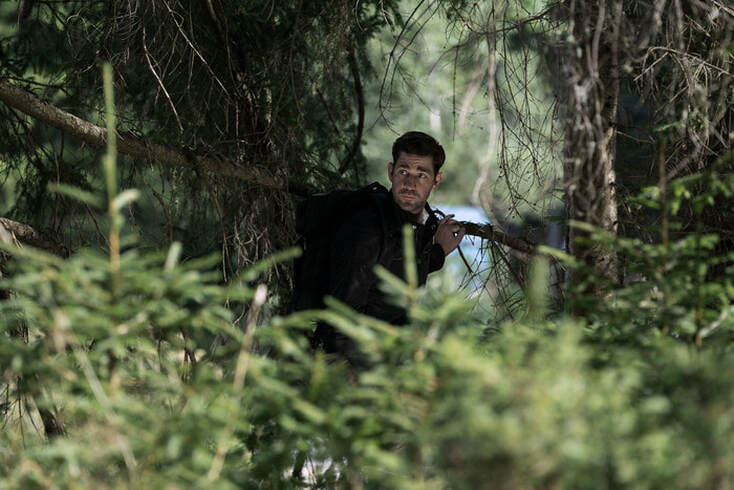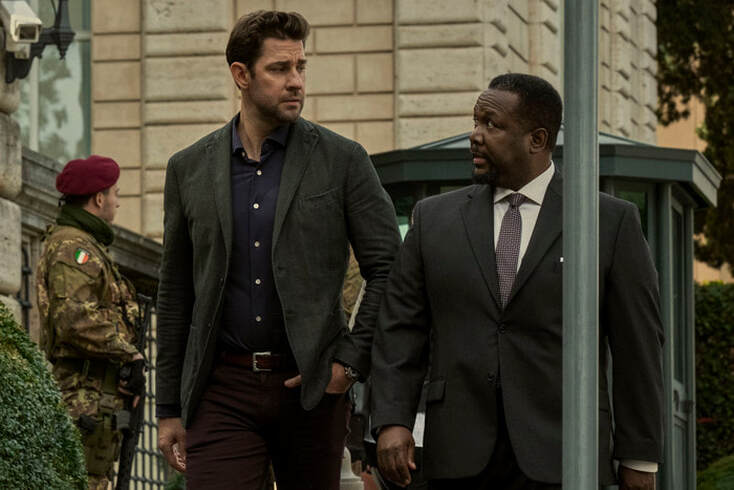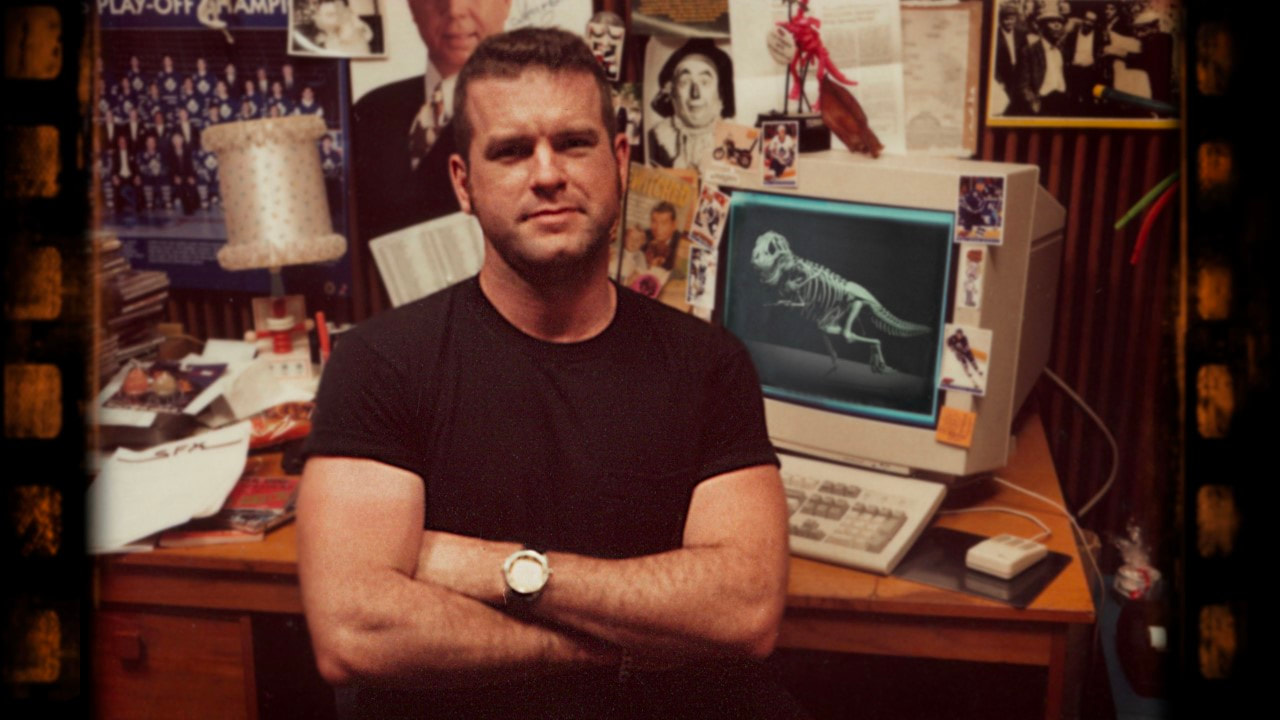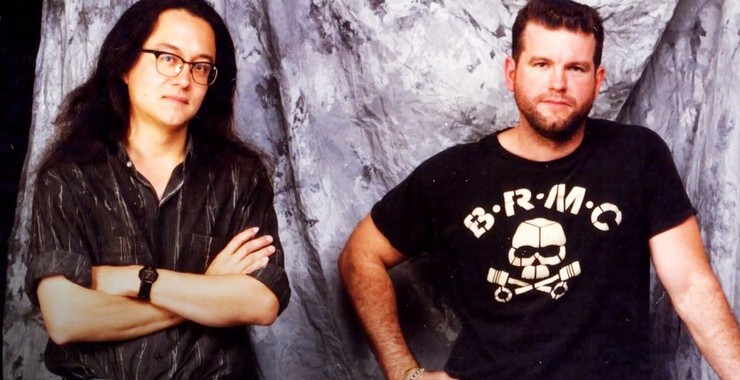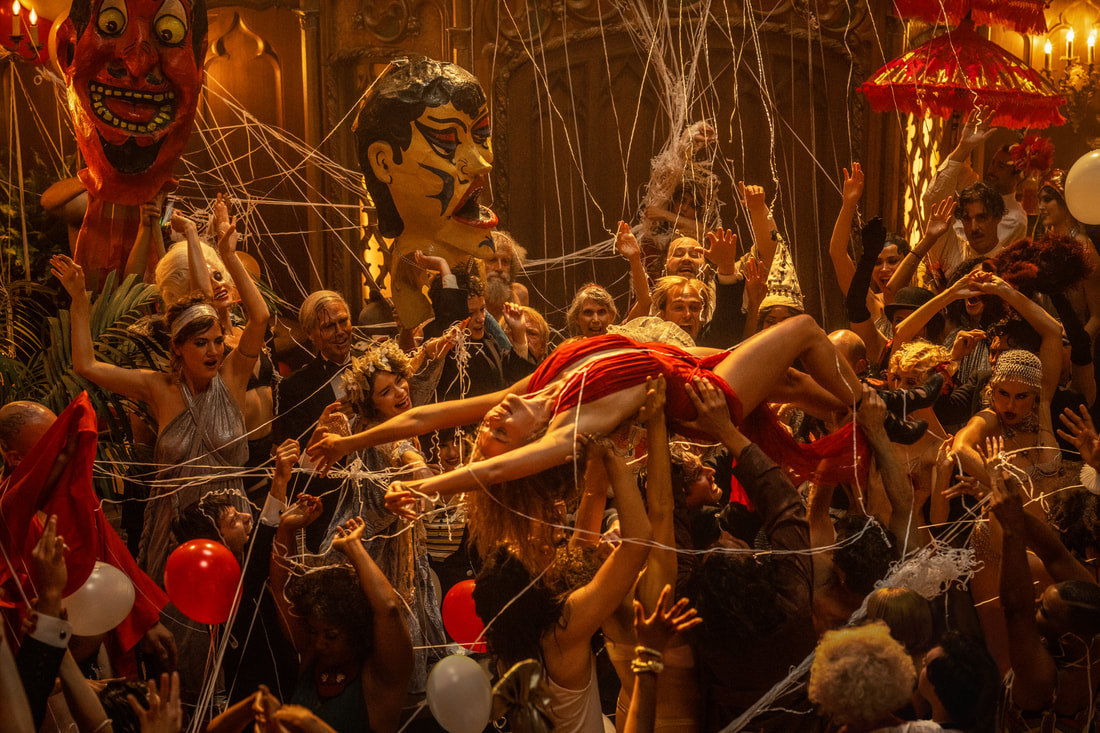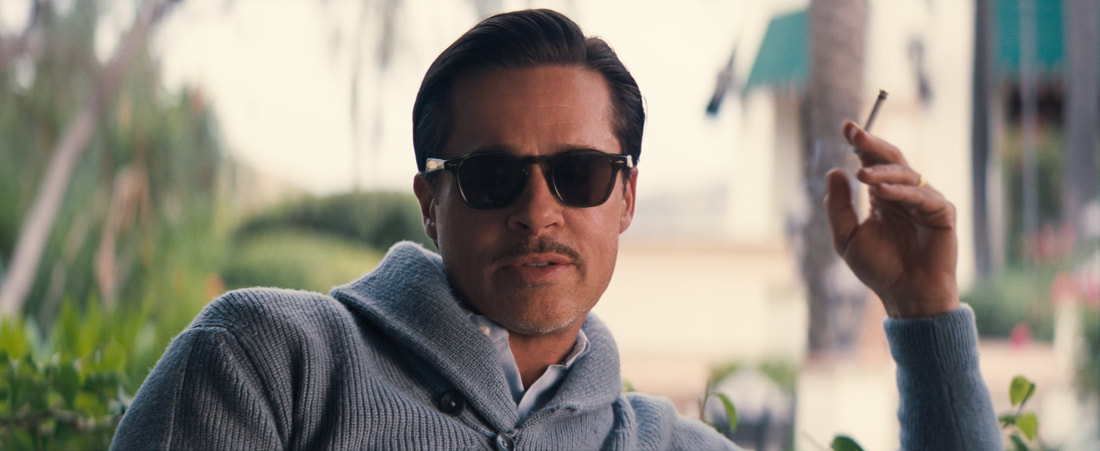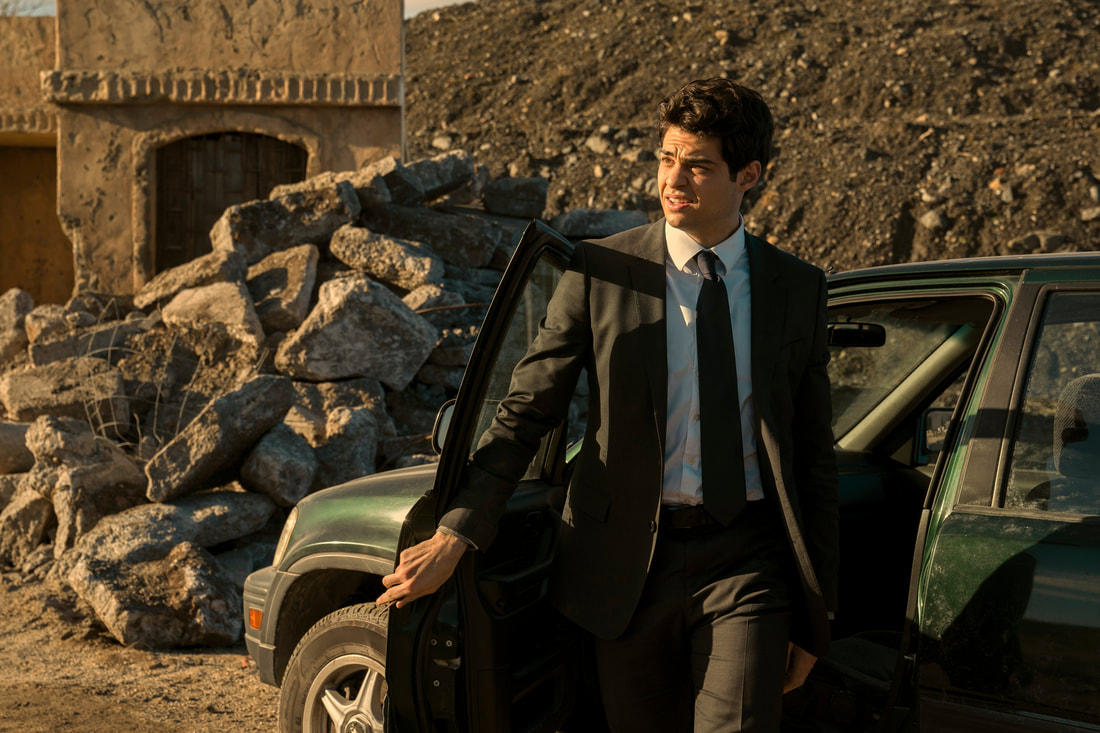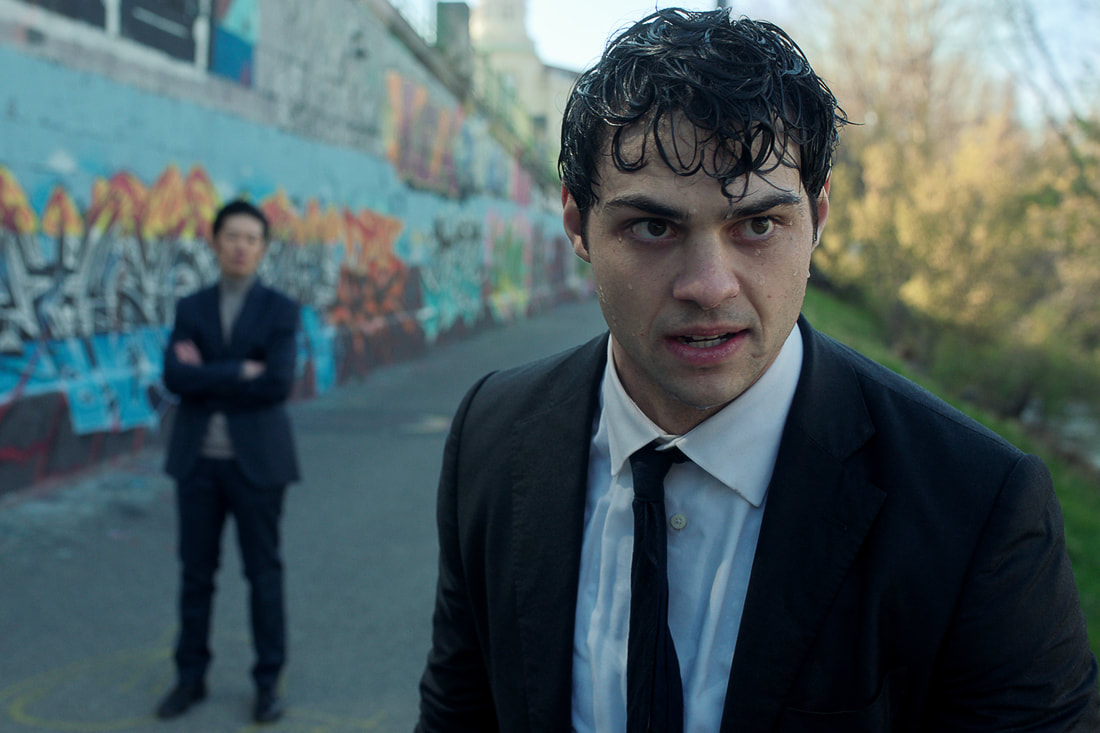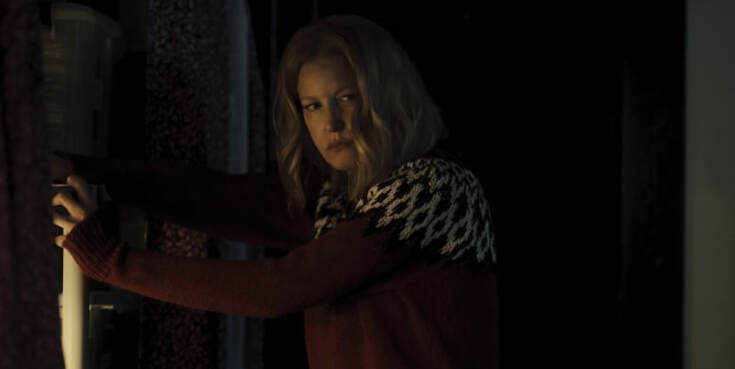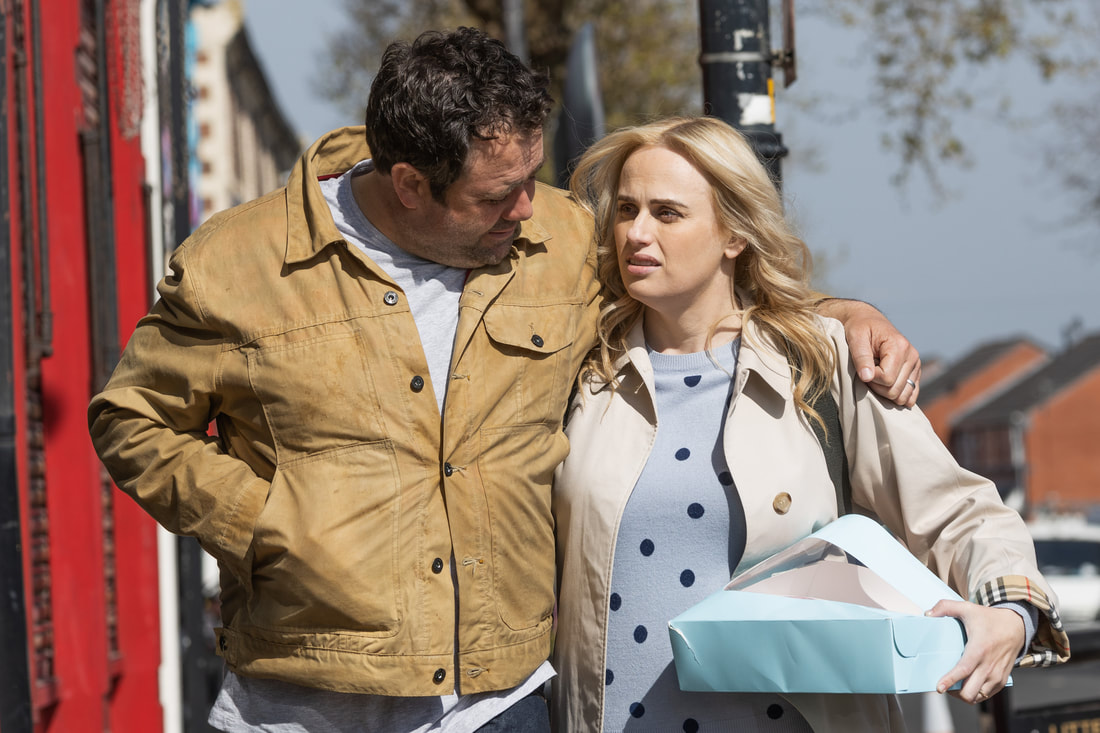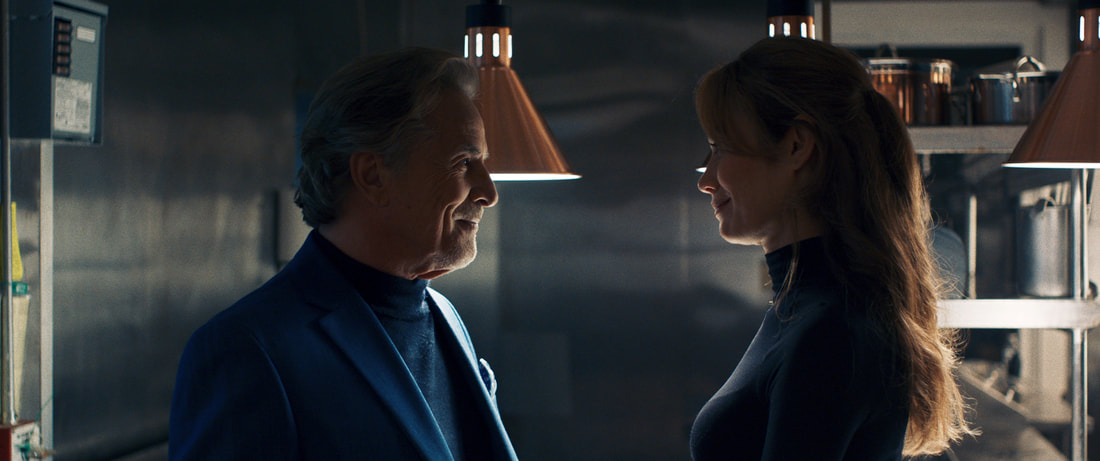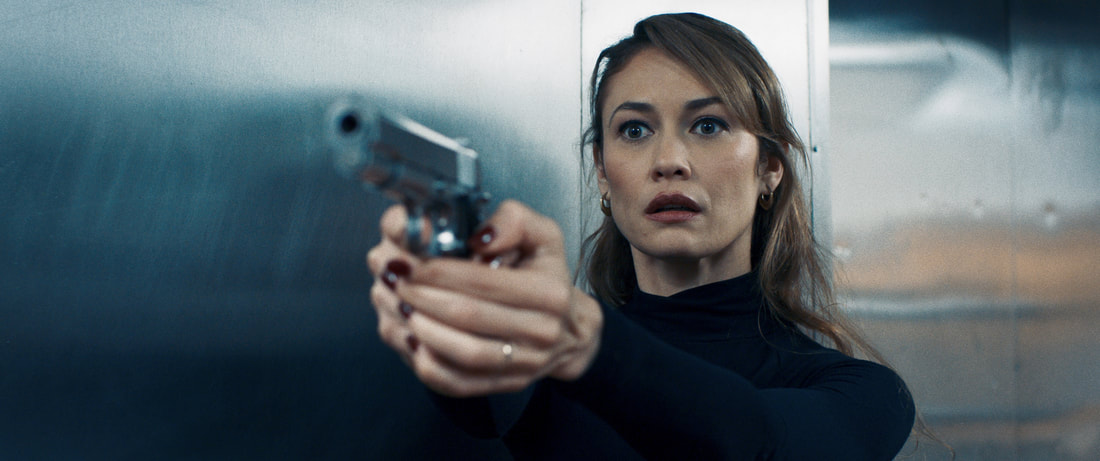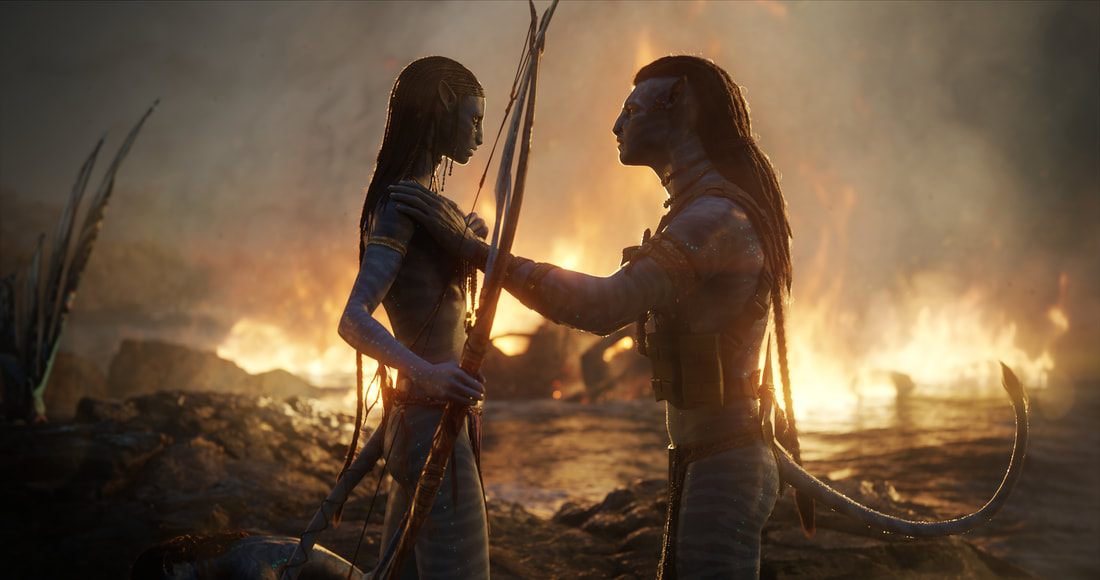|
Review by Adam Donato From the writer of Bohemian Rhapsody comes another family-friendly biopic about a musical icon that also clearly made plenty of business decisions. Hell, even the studio made a business decision last second to include the artist’s name in the title of the movie — as if it was in question whether this is a real Whitney Houston movie. Plopping into a Christmas slate full of critically acclaimed films, Avatar: The Way of Water is sure to garner the lion’s share of box office, while Puss in Boots will take the rest of the family audience. If Babylon is too outrageous and audiences are already caught up with the Thanksgiving blockbusters, then Whitney Houston: I Wanna Dance With Somebody can have whatever’s left. Is the movie good enough to overcome poor marketing? Obviously, the music is fantastic. That’s one thing that’s nice about these biopics is at the bare minimum there’s powerful music throughout. The more musical biopics that get made, the better Rocketman looks. Just like Bohemian Rhapsody, this movie doesn’t have the lead do any of the singing, but they wear a pair of false teeth and suddenly their performance is fantastic. Taron Egerton sang all throughout Rocketman and while it’s understandable to not want to compete with Houston’s voice, there is less to enjoy about Naomi Ackie’s performance. Ackie’s highest profile role was Jannah in Star Wars: The Rise of Skywalker in which she was entirely unremarkable, but it’s not her fault the movie is a disaster. She clearly thrives in a leading role as she does a solid job of carrying this movie. Her performance is the only one of note besides Stanley Tucci's, and he is fantastic in everything he does. Clocking in at just under two and a half hours, it’s clear this needed another editor, or script, or even director. There’s nothing remarkable about the filmmaking in this movie. This feels like the SparkNotes version of her life as there’s no clear through line to the story besides the career of Whitney Houston. None of the supporting characters feel like their story was wrapped up by the end or fleshed out whatsoever. There’s way too much going on in this movie anyways. Is this about her restrictive relationship with her family? Her closeted relationship with her best friend coming into conflict with her marriage to Bobby Brown? The rise of her career with Stanley Tucci? Or is it about the subject of her death and her lifelong struggle with drugs? That’s another thing, why do artists' family and friends want to produce movies about famous artists where their story is covered in bubble wrap? I hope those extra ticket sales for the kids are worth compromising the reality of the story.
People who love Whitney Houston and just want to see this movie for her music and bullet point life story. They won’t care about the technical filmmaking aspects of this movie. They will just be happy to hear the songs and be reminded about a period of history. The runtime may be noticed, but Elvis was ten minutes longer and nobody batted an eye. Houston’s discography and Ackie’s performance are enough to make Whitney Houston: I Wanna Dance With Somebody an enjoyable experience. This should not be an awards contender and will be lost in the shuffle of uninspired and gutless musical biopics. Whitney Houston: I Wanna Dance With Somebody hits theaters on December 23. Rating: 3/5
0 Comments
Review by Dan Skip Allen The Witcher is a popular show on Netflix, but before that, it was a series of books and a video game. With the success of this IP on all levels, it makes sense that Netflix would double down on its success with a second show in this world: The Witcher Blood Origin. Dandelion (Joey Batey), the bard from The Witcher, meets a witch named Seanchai (Minnie Driver) who decides to tell him a story from thousands of years before about the world of elves. It's about a group of elven outliers who must go on a journey to stop a threat bigger than they could imagine. Even though there is a connection to The Witcher, this is a small, contained story. This show is like many other fantasy shows that have come out recently: a group of strangers or outcasts team up to thwart some evil threat bigger than they can see. I was a fan of The Witcher and Henry Cavill in the role of Gellert, but it seems this show lost the charm and humor that series had. It just doesn't have an enjoyable feel to it. It seems a lot campier in its approach but not as realistic in its storytelling. This series seems like a cheap rip-off of The Witcher or other much better fantasy films and shows. More isn't necessarily better. In this case, it's worse. Many of the actors in the series are relatively new to me, except one: Michelle Yeoh. She plays a member of a secret sect of elves, and her group is in danger, so she joins the collective to thwart those responsible for her group's demise. She is fine in the role, but quite a few of their other actors seem a bit over the top or downright bad in their roles. The producers didn't necessarily get the best of the best for this series, even though Yeoh could potentially win an Oscar next year for her work in Everything Everywhere All at Once. That could build the profile of this show.
The visuals were fine, but the costumes and hairstyling looked like a makeup team from a local crafts fair or high school production did the work. The series looks like a low-rent Lord of the Rings or similar. Everything in the production looks very cheap. I'm surprised Netflix greenlit this show at all, apart from trying to capitalize on the popularity of The Witcher. The Witcher: Blood Origin is a series that doesn't need to exist. This show is so bad it's hard to realize how it got made or greenlit, for that matter. The acting isn't great from the cast. They seem like a bunch of day players in a local town production of some fantasy play they are showing at the local theater to the townspeople. It is just not on the level of The Witcher in any way at all. That being said, it will get a lot of viewership from that audience, whether it gets good or bad reviews. The Witcher: Blood Origin streams on Netflix beginning December 25. All four episodes reviewed. Rating: 1/5 Review by Dan Skip Allen Jack Ryan is one of Tom Clancy's most popular characters. He had five films before he got his own series on Prime Video starring John Krasinski. The first season was very good, introducing fans to a new iteration of this character. The second season was not as good, but it was entertaining nonetheless. This December, the third-season premiers and fans will be in for the ride of their lives with a lot of espionage and spy games. Clancy has focused on Russia in some of his works, so it makes sense that Jack Ryan (John Krasinski) tackles this Eastern European juggernaut in his series. CIA Agent Jack Ryan gets accused of the murder of a Russian soldier, which ends up getting him in prison, but he escapes and has to figure out who set him up and what this has to do with their actual plan: starting World War III between the US and the Russians. The series is very complicated and deals with topics very close to home regarding the war in Ukraine and Russia's involvement. Ukraine plays a significant part in the show this season. Nina Hoss plays the president of Ukraine, and her father, played by Peter Guinness, is an ex-Russian patriot who has dreams of the motherland and bringing it back to prominence as a world power once again. There are many moving pieces involving a cue in Russia and problems within the ranks of the CIA which get the top brass of the US involved. Krasinski's Ryan gets some help from a few friends from past seasons: James Greer (Wendall Pierce) and Mike November (Michael Pierce). He needs all the help he can get as this show spans a lot of history and European grounds. This season, the show goes to Austria, Hungary, Czechoslovakia, Ukraine, Russia, and of course, the United States. It's part of what makes this series so good. This season, there is a historical aspect to the show regarding the Russian side of the story. It gives a backstory to what motivated them to do these things they are attempting to do in the present time. Guinness and James Cosmo play ex-Russian soldiers, and their characters are focused on as young men in the flashbacks. This gives a lot of context to the series this season.
Like always in this show, there are plenty of action scenes and set pieces, but not to the level of something like a Mission: Impossible film. They have to work within a budget. That's not to say this series isn't action-packed or dull in any way. It just has to do things in a less-than-explosive way. There is more espionage this season than in seasons past. That makes sense because of who the show is dealing with. Both the Russian and US sides of the story have a lot of intrigue and subterfuge. It is hard to follow along with who we, as viewers, can trust and not trust throughout the series. That being said, this season lacks a little extra oomph that other seasons had. There is much more talking and walking and men in prison, and not enough of what I've come to expect from this series thus far. I think a reason for that is the pandemic. I believe this show was plagued by problems because of restrictions from COVID-19. Many countries had stringent laws involving their borders, mask mandates, and so forth. That may have played a part in why this season was more grounded and less explosive. Krasinski and company were fantastic in season three of Tom Clancy's Jack Ryan, given the pressure they were under while making this show this season. The story was very good, and the backstory helped develop some newer characters, especially the Russian ones. The connection to Ukraine has made it a show people will watch. That was a nice touch trying it to recent events. The series as a whole was entertaining, but I would have liked to see what they could have done had this not been filmed during the pandemic years — maybe more action and explosions instead of so much talking and exposition. Tom Clancy's Jack Ryan streams on Prime Video beginning December 21. Rating: 3.5/5 Review by Camden Ferrell Movies are a wonderful medium that captivates people all over the world. Many people contribute to the final product, and one aspect that is crucial to filmmaking but can sometimes get overlooked is visual effects. Jurassic Punk is a documentary that follows the work of VFX pioneer Steve Williams and the role him and his colleagues played in the introduction of CGI in movies. Directed by Scott Leberecht, this movie had its premiere at the 2022 SXSW Film Festival. It may lack charisma and might have some weird narrative shifts, but this documentary is quite educational and insightful into the VFX work of some timeless classics. In this documentary, we get to hear from industry legends and professionals about the work that went into the visual effects for various movies in the late 20th century. We get an in depth look into the actual technology, techniques, and methods that were used to achieve groundbreaking effects, and we also get a behind the scenes look at the studio politics of the time. This is an interesting period in film history, and it’s one that is important to learn as it plays a big role in so many of our favorite movies. I really enjoyed a lot of the interviews and guests they got to star in this, and for people who thrive behind camera, they are quite interesting to watch talk in front of it as well. They have great anecdotes to tell about their jobs and the famous people they’ve worked with, and they have a light sense of humor that makes the film feel quite fun at times. It also has some great archival footage and VFX test footage to help audiences get a feel for what the work was like at the time. While it is interesting and engaging at times, it also doesn’t have a whole lot of personality in its execution. It plays like a very solid History Channel special, but it purely relies on its subject matter to engage audience and doesn’t really do anything creative with the way it tells its story. That being said, it is full of great trivia and information about the VFX work of great movies like Jurassic Park, The Abyss, and Terminator 2: Judgment Day.
One thing that stuck out was the drastic tonal shift the movie makes in its final half hour. While it was always concerned with the work of Steve Williams, it takes a sharp turn into his personal life towards the end. His story is an emotional one, but this aspect feels oddly shoehorned into the movie, and it ruins the flow of the documentary greatly. His personal story could have been hinted throughout or slowly developed, but it seems to abandon its objective and thesis at the end to almost exclusively focus on his personal struggles. Jurassic Punk won’t win any points for innovation like its subjects, but it is an interesting look at the world of VFX. It’s a great starting point to learn about the history of computer-generated graphics in film and a chance to hear from the people who pioneered that. It is a little clunky towards the end, and it’s execution leaves a lot to be desired, but this is still quite informative and enjoyable for a casual viewer. Jurassic Punk is in theaters and on VOD December 16. Rating: 3.5/5
Review by Sean Boelman
With the one-two punch of Whiplash and La La Land, Damien Chazelle cemented himself as one of Hollywood’s favorite filmmakers. As such, it was pretty shocking when it was revealed that his newest film, Babylon, would be a hard-R portrait of the success of the industry. While the movie is undeniably entertaining, Chazelle’s film bites off a bit more than it can chew, holding it back from greatness.
The movie follows the rise and fall of a group of movers and shakers in the Golden Age of Hollywood, from silent movie stars and starlets to wannabe big shot movie producers. There are plenty of obvious comparisons to be made — Singin’ in the Rain, Boogie Nights — but one thing is clear: what Chazelle has made is disappointingly derivative despite its constant attempts to stand out. The sense of humor in the film is nothing like one would expect from Chazelle, with a level of crudeness that often approaches gross-out. Within the first five minutes, audiences will immediately be able to tell if they are on the same wavelength as the movie’s crass humor. And for much of the first hour and a half, it’s pretty damn hilarious. Unfortunately, in the second half of the film, it gives up on being a whimsical, excessive Hollywood farce and turns into something much darker and more existential. That isn’t to say it’s any more restrained — it’s still thoroughly over-the-top — but the feeling of fun is removed from the equation. It’s at this point where Chazelle starts taking the characters in directions that don’t make a ton of sense.
Margot Robbie is mostly playing the same character she always does. That is to say, she’s very good in the role, but it’s nothing new for her — over-the-top, ditsy, and alluring. Her co-star, relative newcomer Diego Calva, has some ups and downs. In some moments, he struggles to keep up with the veteran performers acting circles around him, and in others, he completely commands the attention of the viewer.
Brad Pitt, on the other hand, gives what might be the best performance of his career. While exuding the same level of charm that he always does on screen, Pitt also channels a breathtaking level of vulnerability. His character is undeniably the movie’s most compelling, and it is in large part due to Pitt’s extraordinary turn. Unfortunately — and perhaps most surprisingly, given Chazelle’s track record — the film is simply ugly to look at. Although there are certainly some innovative technical accomplishments throughout, such as the opening scene tracking shots through the party, lots of it is unexpectedly out-of-focus. A grimy aesthetic was clearly purposeful, but it becomes distracting at a point. Babylon might be Chazelle’s most entertaining movie yet, as there isn’t a single boring moment in its over three-hour runtime. Yet, despite the hyperactive pacing and a wealth of excess, it never manages to capture the magic of the films to which it pays homage — or even Chazelle’s previous ode to Hollywood, for that matter. Babylon hits theaters on December 23. Rating: 3.5/5 Review by Dan Skip Allen New shows premiere on Netflix every week. Some of them get noticed by fans and critics right away because they have some buzz behind them or awards chatter. Other times, they go unnoticed by most people. That is until word of mouth gets around and people start watching said film or show. One of those shows is The Recruit, the new dramedy starring Noah Centineo as the titular title character. Owen Hendricks (Noah Centineo, Black Adam) is a new young lawyer for the General Council in the CIA. He is the guy that older members in his office, Lester and Violet (Colton Dunn, Arti Mann), pick on. As a joke, he gets to go through a bunch of old mail the CIA got. His life changes when he receives a mailer from inmate Max Maladze (Laura Haddock). This starts them down a road of international espionage and a cat-and-mouse game he never expected to be involved in. The main character, played by Centineo, travels to Phoenix, Arizona, to visit Haddock's character. She is an enigma, though; he has to go back home to his two roommates, Hannah and Terrance (Fivel Stewart, Daniel Quincy Annoh), with his tail between his legs. He likes to confide with these two young people who are very similar to him in many ways. He even dated Stewart's character for a time, so there is that sexual tension that still lingers. Like any great spy show, The Recruit is a globe-trotter. It goes everywhere, like Yemen, Vienna, Beirut, Belarus, Russia, and Washington, D.C., where it's set. Words like asset, State Department, Justice Department, Office of Technical Support, and Case Officer are thrown around like candy. This government and spy lingo helps the show be even more authentic than it already is. The showrunner and creator Alexi Hawley lathers this series in spy and espionage goodness. It's hard to keep up sometimes. The show is about lawyers in the CIA, so legal drama must be present in the series. There is a side plot of a corrupt senator subpoenaing the main character to court. This gets the attorney general involved. Then there is a secret opp involving a Mexican Cartel and missiles. The series mixes in a lot of cool elements like these to help create a fun, adventure-filled spy show. Along with these subplots, there are also some romantic ties among the characters in the series. These add a fun change to a rather serious show.
With all good series, there has to be a strong supporting cast. Along with the main characters, there are some fantastic supporting characters. The head of the CIA, Walter Nyland (Vondie Curtis-Hall), plays the straight man in all the crazy spy games. Curtis-Hall is always good whenever he pops up in a show or film. Dawn Gilbane (Angel Parker) is a Case Officer with her own agenda. Xander Goi (Byron Mann) is another spy overseas who wants to get a big promotion. Amelia (Kaylah Zander) is another member of the CIA who has an attraction to the main character, but she helps him navigate the dark waters that is the government. Some flashbacks give a little backstory to one of the main characters and show some counterintelligence and various spy jargon. These flashbacks give the series a little more importance when it comes to its overall character development. That is the show's strength: how it takes these characters and makes them an important part. Along with the subplots and the main story, the writing is impeccable by Hawley. The Recruit is a breath of fresh air in the spy and espionage genre. It has a very good story and direction by Hawley, and Centineo is a revelation in this series. After starring in this show, he will be on many people's lists to cast in the future. He made this show his own. The supporting cast was also outstanding. The show could have gotten lost with all these characters, but they all serve a purpose and add to the overall story. Netflix has done it again. This will be another water cooler show that, once the world gets around, everybody will watch it. The Recruit is now streaming on Netflix. All eight episodes reviewed. Rating: 4.5/5 Review by Joseph Fayed Hell hath no fury like a woman whose daughter went missing 20 years ago. That proverb is the most accurate description you will find of The Apology. Mothers of missing children tend to fall into familiar territory, given their motivation to quickly learn the truth of what happened to their children. This film is no exception to that. The thriller is set during the holidays that find the mother of a missing daughter Darlene (Anna Gunn), welcoming a familiar face into her home. Jack (Linus Roache) reveals a secret he has kept hidden for years. The mother is a recovered alcoholic — apparently, she has nothing else going for her, or at least they don't bother telling us more about her — who marks the 20th year her daughter went missing by being interviewed on TV. Jack shows up unexpectedly at Darlene's home and states that without any harm, he wants to tell her what really happened to her daughter Sally. Anna Gunn's performance as the grieving mother who is told something she always dreaded hearing is what will keep you engaged the most. She will keep you emotionally invested enough not to wonder why Lifetime didn't greenlight this script. It has some Lifetime film attributes: a white woman who is/was a functioning alcoholic, the mostly irrelevant best friend who wears worse clothes than her friend, and the man who never has his motivations about anything questioned until it's too late. With characters so hollow, you feel that the conclusion will be anything but satisfying, and this one feels rushed. Twists and gore are two gifts you will not be receiving this holiday season from this film. The "mystery" surrounding Sally's disappearance is laid out for the viewers around the climax. As for gore, you won't be yelling "yaass queen" at Darlene during any physical confrontation she has with Jack. It is very run-of-the-mill because none of its ideas are original. Vengeance or getting justice serves as nothing more than driving you from point A to point B. When that or the only three characters your film chooses to focus on can't carry their weight, you really don't have much to say with your story.
Jaycee Lee Dugard was not kidnapped and held captive for 18 years just to be name-dropped in this below-average thriller. The Apology is not accepted, as the film is not riveting enough to show the raw emotions or mysteries surrounding a missing persons case. The Apology is now in theaters and on VOD. Rating: 1.5/5 Review by Sean Boelman Typically, in the midst of awards season, there is one film that is a would-be awards contender that gets released quietly because it didn’t exactly turn out as planned. This year, it’s The Almond and the Seahorse, a movie with a premise that feels like clear Oscar bait but execution that is more akin to a Lifetime movie. Based on a play by Kaite O’Reilly, the film follows two couples whose lives are torn apart by a traumatic brain injury. There are several routes this movie could have taken — a serious drama, a sweet romance, or something else — but the film instead goes for all of the above, and the result is uneven and messy. The movie attempts to approach the sensitive topics of traumatic brain injury and memory loss, but it bites off more than it can chew. The few scenes in which the film does engage with the material are painfully obvious expositional dialogue. Other scenes seem to completely misunderstand the discussion around learning disabilities. Although the movie is well-intentioned, its tone is so inconsistent that it’s hard to get on board. There are some parts in which it’s attempting to be horrifying and devastating a la The Father, and others where it’s sentimental and cheesy like 50 First Dates, and the constant tonal whiplash is frustrating. Rebel Wilson is not particularly known as a dramatic actress, and while she shows some potential, it can be somewhat hard to take her seriously in the role. Particularly in the more intense dramatic moments, it almost feels as if she is whining, and as a result, viewers will unfortunately be left laughing at scenes that should be devastating.
Although Wilson’s character dominates the narrative, the film is clearly trying to be kaleidoscopic in nature. The result is that a second storyline — starring Charlotte Gainsbourg and Trine Dyrholm as a couple going through a similar struggle as Wilson and her husband’s — feels entirely underdeveloped. It’s a shame, because Gainsbourg and Dyrholm are the more interesting performers. Given that the movie is adapted from a play, there isn’t a ton of showiness to the execution, but it also fails to take advantage of the feeling of confinement like many other films about mental disability do. The whole thing has a very maudlin feel to it, not helped by oversaturated cinematography and an unfittingly vibrant score. There are certainly some redeemable qualities to The Almond and the Seahorse, and its good intentions are quite obvious. Unfortunately, good intentions alone do not make a good movie, and the filmmakers’ misguided approach prevents this from being a worthy addition to the conversation. The Almond and the Seahorse hits theaters and VOD on December 16. Rating: 2.5/5 Review by Sean Boelman We’ve seen it time and time again: a B-movie partnering a legend of the screen with a pretty recognizable up-and-comer against the backdrop of a plot that both of them are too good for. In High Heat, it’s Don Johnson and Olga Kurylenko to fit that bill, but director Zach Golden manages to elevate the material into something surprisingly fun. The film follows a chef with a mysterious past as she is forced to defend her restaurant when the mafia come to burn it down in search of a debt owed to them by her husband. Given that most of the movie is confined to the restaurant, you’d think it would get old pretty quickly, but Golden’s dynamic direction keeps it refreshing. The action isn’t particularly innovative, but the violence comes in short bursts that are consistent enough through the film to keep the momentum going. And at a mere eighty-three minutes in length, it’s hard to screw up a B-grade action flick so long as it’s action-packed and doesn’t feel overly serious. Olga Kurylenko has shown plenty of potential in the past to be the next great badass action heroine — she’s just waiting for the right project to come along to showcase her talents. While High Heat isn’t quite the project to slingshot her into stardom, she’s still very good here, and obviously having a blast in the role. That being said, her chemistry with co-star Don Johnson isn’t particularly strong — but just as much blame can be placed on Johnson as her. Johnson is phoning it in a bit, almost as if he feels he is above doing this. Yet despite this, he nonetheless manages to crack a few witty one-liners that will leave a smile on the viewer’s face.
As is the case with many B-movies, the character development might as well be irrelevant. The marriage stuff between Kurylenko and Johnson’s characters is just not very interesting, and the background they give Kurylenko to have combat skills is lazy and generic, but the target audience of this won’t really care. Apart from those quips, the humor mostly falls flat. One subplot, following a bickering assassin couple (Kaitlin Doubleday and Chris Diamantopoulos) just spins its wheels. It almost feels as if it was taken out of a completely different script and shoved into this one because things were running too short. High Heat might be a good movie by conventional standards, but in terms of schlocky B-movie action flicks, you could do worse. It’s definitely a step in the right direction for Kurylenko, who is actually used properly here — maybe someone will see this and cast her in the role she deserves. High Heat hits VOD on December 16. Rating: 3/5
Review by Sean Boelman
James Cameron’s Avatar is the highest-grossing film of all time by a long shot, and while some have soured on it since its release, it still holds a cultural impact like few other original blockbusters do. The long-awaited sequel Avatar: The Way of Water is finally hitting theaters, and while one would hope that all of the delays would have resulted in a final product nearing perfection, it wasn’t worth the wait.
Set years after the original movie, this sequel follows Jake Sully as he lives with a new family and finds himself forced to protect the Na’vi people again when the humans return to the planet of Pandora. Promising bigger, better world-building and an expansion to more parts of Pandora, the film plays out with beats that are not only eerily familiar to the original, but also several blockbusters of the past ten years. Much like its predecessor, The Way of Water is an absolute behemoth of a movie. It’s three hours and ten minutes of gigantic, CGI spectacle. Yet, despite Cameron’s best efforts, it feels like it’s going through the motions. Certain aspects — like the underwater scenes — are clearly innovative, but other than that, the film hardly attempts to one-up the original that came out over a decade ago. Cameron has insisted that nearly every showing in every theater across the country — at least the ones that are equipped to handle it — are shown in high frame rate. And while the 3D is impressive and the visual effects are undeniably ambitious, the HFR makes everything look like a video game cutscene, especially the action sequences. For a movie that is meant to immerse you in another world, this is wholly distracting.
For some reason, Cameron also thought it wise to bring back Sigourney Weaver playing a new, younger character. Although it is explained in the film, it’s about as stupid of a reason as they come. And worse, Weaver is distracting, as she plays a teenager despite clearly sounding like a seventy-year-old woman. They also bring back Stephen Lang, and while his part is not as dumb, it’s also frustratingly generic.
The themes of the movie also don’t have the same emotional impact. Although they thankfully got rid of the terribly-named Unobtanium, this new movie targets the whaling industry. However, the way in which these scenes are shot is like an action sequence, lacking the same emotional resonance as the scene in which the forest was destroyed in the first film. Additionally, in trying to pass the torch to a new generation of characters, Cameron bites off more than he can chew. There are seven children in the new generation, and despite the runtime, there simply isn’t enough room in the narrative to develop them all while still expanding the original generation’s arcs. The overarching family themes are nice, but individually, their stories leave something to be desired. Avatar: The Way of Water reeks of no one telling the filmmaker no, but with someone as influential and groundbreaking as Cameron, who can blame them? It’s an ambitious swing and a miss — not quite a childhood-ruiner, but disappointing enough that you wish the Sky People (and Cameron) had left Pandora alone. Avatar: The Way of Water opens in theaters on December 16. Rating: 2.5/5 |
Archives
July 2024
Authors
All
|
|
|
disappointment media
Dedicated to unique and diverse perspectives on cinema! |

